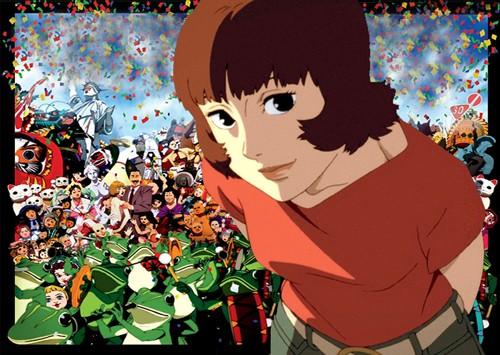
Anyone impressed by the complex, multi-layered narrative in Christopher Nolan’s multi-layered Inception should see Paprika, which came out in 2006.
In Satoshi Kon’s animated science-fiction epic, we follow a Japanese research psychotherapist named Dr. Atsuko Chiba who, by night, adventures into her patients dreams using a high-tech innovation called a DC Mini. As she enters these virtual realities, she takes on the name Paprika. And when terrorists nab DC Minis so they can invade other people’s dreams, Paprika goes dream-diving to track down the true identities of the crooks. And we’re taken on an exhilarating ride through kaleidoscopic imagery.
For all of the laughs and surprises in his film, Satoshi Kon explores frightening possibilities. He suggests there is a sort of stealth warfare occurring, as we watch a parade of American icons advance down the avenues of a Japanese imagination. While our sexy heroine strives to make sense of dreams, others merely indulge in them. Were left to ponder how movies, pop-culture, and other art forms can be used to shape the thoughts of nave, impulsive people.
But the film is not a condemnation of imagination the characters end up fighting for their dreams, defending them against those who would manipulate them. It’s not just a cartoon. Paprika is a rewarding, entertaining, and sometimes terrifying movie for discerning adults.
In 2001, Spirited Away won the Best Animated Feature Oscar, and won a new American audience for Japanese animated features. Now Hayao Miyazake’s movies are major big-screen events, and he’s still working. Satoshi Kon was just beginning to command that kind of respect after the release of Paprika. To the shock and dismay of animation fans around the world, he died in 2010 of pancreatic cancer. He was only 46.
—Jeffrey Overstreet
- Directed by: Satoshi Kon
- Produced by:
- Written by: Seishi Minakami Satoshi Kon Yasutaka Tsutsui
- Music by: Susumu Hirasawa
- Cinematography by: Michiya Katou
- Editing by: Takeshi Seyama
- Release Date: 2006
- Running Time: 90
- Language: Japanese, English
Arts & Faith Lists:
2011 Top 100 — #80